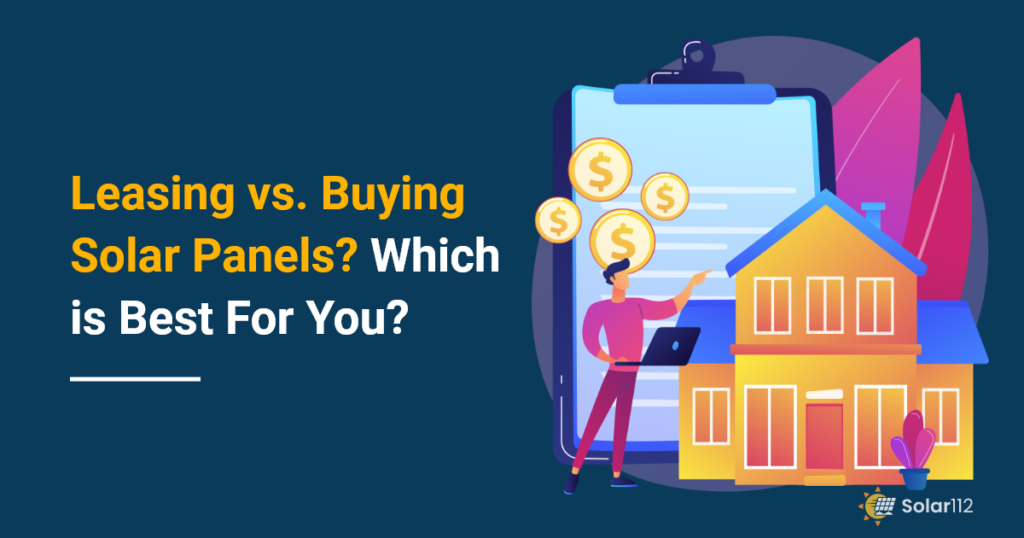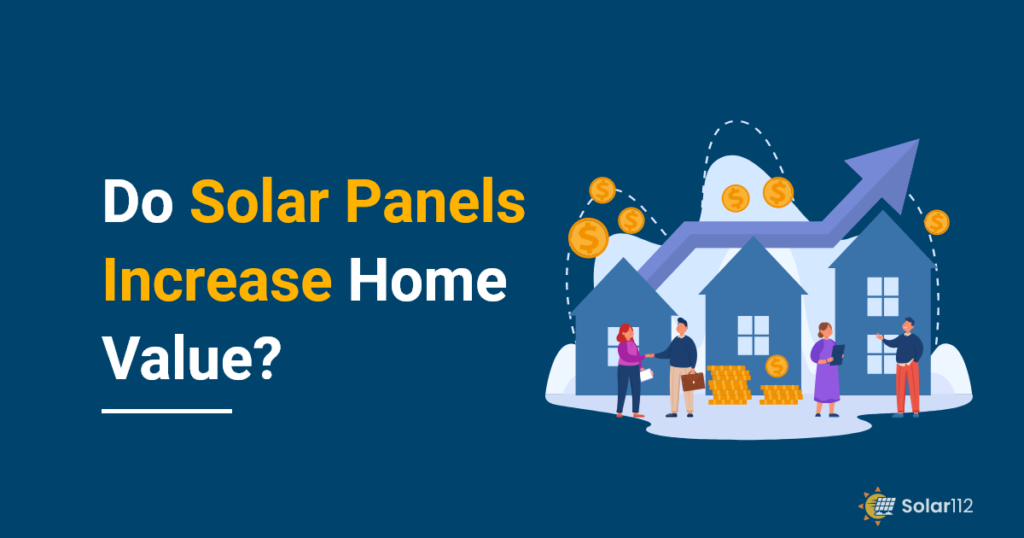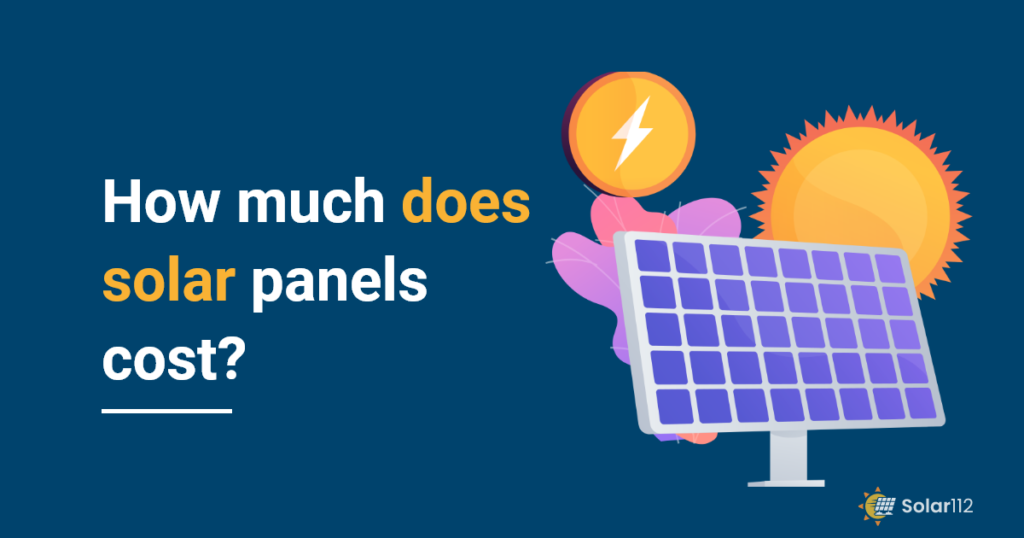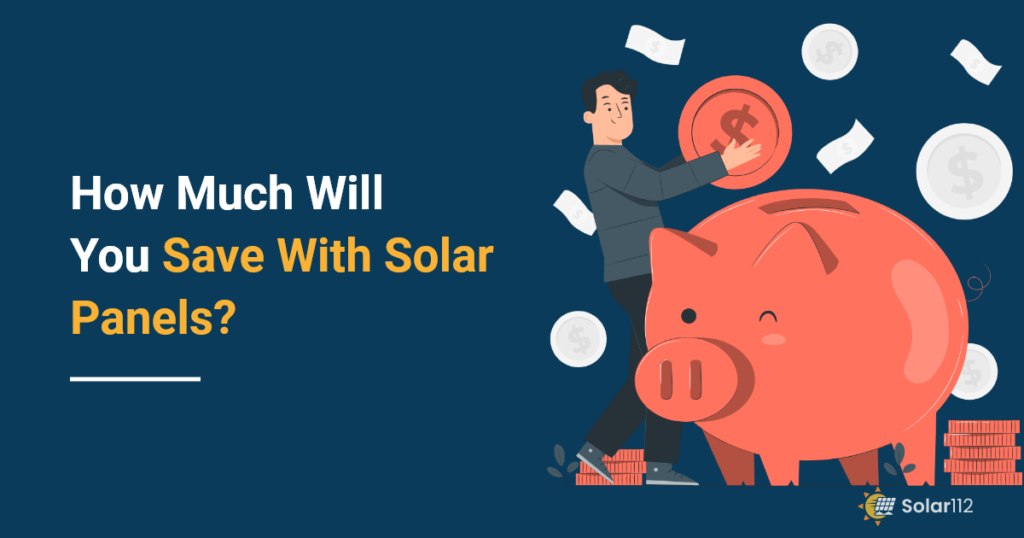Should I go with solar buying or solar leasing for my home? Stop juggling between these two.
Installing solar panels on a property demands a significant upfront investment. Based on a survey in which 1000 households installed the system on their rooftops, the average cost of the entire solar project was between $15,000 and $20,000. However, the stated average number by SEIA for residential solar systems is even bigger, that is, around $25,000.
While some people could purchase the rooftop solar system, it is not a viable option for everyone. Hence, it is no wonder why households look for other solar financing options, such as solar leases.
But which option will be best for you – solar leasing or solar buying?
Both of these two financing solutions have their own sets of benefits and disadvantages in terms of finances, ownership, and added value.
To know which one is better than which one, when, and why, we have curated this comprehensive guide in which we will help you choose the best solar funding option for you based on your requirements.
So, keep reading!
Leasing vs. Buying Solar Panels: Key Criterias
While going solar, either via solar lease or buy, there are following questions that often cross a homeowner’s mind:
- How much will it cost me?
- Who will hold the ownership status?
- Will I be able to collect the solar state or local incentives?
- Which option will give me higher lifetime savings?
- What about the maintenance part?
- What will happen if I relocate or sell the home?
Well, all the aforementioned questions are the criterias that differentiates between solar leasing and solar purchasing options. Let’s understand each of these in detail, one by one.
Key to Leasing Solar Panels
A solar lease is a financial agreement in which the solar company installs the PV panels on a homeowner’s property while still retaining ownership. It gives customers a more attainable way of going solar who can’t afford the entire upfront cost.
The residents can either choose to pay a fixed monthly payment in exchange for solar equipment or they can go for a power purchase agreement (PPA), in which the family pays for the power generated by the panels they use in their daily lives. Either way, using the solar lease arrangement, the homeowner would be able to use the system’s electricity without bearing the upfront costs. Let’s get to know the difference between these two in a bit more detail.
Ways to lease solar panels
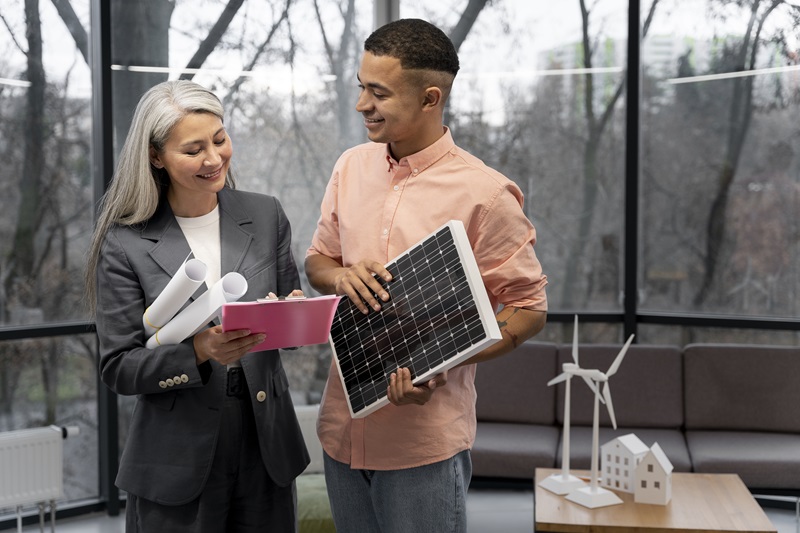
Fixed monthly solar lease
This method of solar leasing is very simple. Under this, you pay the solar company a fixed lower amount of monthly lease installment in exchange for your power bill. So, let’s say your monthly electricity bill is $100. Then, your monthly lease payment might be around $60, thus helping you save a potential $40 for a month and $480 for a year.
However, the only drawback with this solar lease option is the annual escalator, which raises the roughly monthly installment by roughly 3%. So, in the long run, following this rate will surpass the monthly installment over your net power bill and end up being expensive.
Power Purchase Agreement (PPA)
In PPA, instead of paying a fixed monthly installment, households pay for the electricity generated by the system. The notion is to provide solar power at a lower rate than from utility providers. For example, your PPA provider might offer you electricity at the rate of 10 cents per KWh while the utility grid charges you 15 cents per KWh.
However, the escalator plays a role in PPA too. So, while you can save upfront costs by leasing panels, you will end up with lesser long-term savings on a solar lease.
Key to Buying Solar Panels
Buying the solar panels outright requires considerable upfront capital in exchange for system ownership. However, it rewards you in the long run with greater savings on the power bills, extra tax credits with the solar incentive programs run by state and local authorities for the homeowners who own the solar panels, and additional earnings with the net metering program.
Moreover, installing solar panels increases the home value by 4%. So, let’s say, if we consider Zillow’s stats, the average home value in the U.S. is $348,539, and if you install the PV system, it will rise by $13,941 (i.e., 4%), close to the bracket of the average solar project cost. But since the investment is there, while buying solar panels, you should always look for multiple solar companies or solar contractors for quotes.
Ways to buy solar panels
Cash
Purchasing solar panels with cash might seem like a heavy upfront expense; however, it is the most efficient way to buy panels. The reason is simple. Since you are paying in cash, there would be no such thing as interest on the payments. Also, with no additional hidden fee, you can start reaping the benefits of solar the moment you make the full payment.
Solar Loan
While with a solar loan, you can fully own the solar panels in the future while also enjoying the solar incentives and rebates, you will be levied a rate of interest during the loan tenure. This means that, using a solar loan, you will end up paying more than the actual upfront cost. Moreover, you will also need a reliable solar financing company that could provide you with a loan at better interest rates. An additional hassle!
Pros and Cons of Buying Solar Panels
Buying solar panels entirely for your home comes with its own share of advantages and disadvantages. Let’s take a glimpse at its plus points first.
What Will Buying Solar Panels Bring to Your Door?
More savings in the long run
One of the major reasons for buying solar panels (if your budget allows) is that you start saving on your utility bills from the very first month. Unlike solar leasing, there are no hassles with recurring payments. And if you are planning to stay for a longer duration, then purchasing the solar system makes it a better financing choice.
Usually, solar companies or contractors provide an average of 20–25 years of guarantee on estimated power production. So, if, in any case, your system does not generate the electricity it was supposed to, the company will reimburse the difference.
Whatever the case, if you own the solar panel system, you will be able to save the amount of money on bills equivalent to the amount of money you paid for the panels within 7–10 periods of time. Thus ensuring you not just the savings but the greater returns on investment.
Increases the value of your property
Did you know that installing panels on your property increases its value by 4%? That’s true. That contributes to one of the reasons why homeowners prefer buying over leasing solar panels.
Currently, the demand for homes equipped with solar systems is high, with families switching towards sustainable choices while at the same time saving more money. Buying panels will help you get more buyers.
Furthermore, since you own the system wholly, there is no third party involved in it, which will make it easier for you to sell your home.
Tax credits and incentives
- Federal Tax Credit: According to the 2022 Inflation Reduction Act, the Federal Tax Credit, or Investment Tax Credit (ITC), provides a 30% solar tax credit on the overall cost of a solar panel project. The government started this program with the intention of making solar more affordable to residents. However, only the homeowners who own the solar panel system are eligible for these credits.
- State Tax Credits: Several states offer additional solar incentives in addition to the federal tax credits, which can vary greatly from state to state. Also, these tax credits work in the same fashion as federal ones; the only difference here is that they work for state taxes. States that offer higher upfront rebates of upto 10–20% on installing rooftop solar panels are California, New York, Texas, and others.
- Local Incentives: Purchasing solar panels also lets you take advantage of local incentives via net metering programs. Under this, you can sell the extra electricity produced by your system to the local utility providers and generate additional income.
What kind of problems will buying solar panels create?
Higher upfront costs
Whether you are planning to buy solar panels using cash or a solar loan, you need to have significant funds in your bank account. And that too, after considering all the federal or state tax credits. Unfortunately, not everyone is capable of having such sizable funds, making it an impractical choice for them.
Post-installation maintenance requirements
Buying a solar system comes with not only monetary benefits but also a certain set of responsibilities. After the installation of panels, it is entirely your duty to keep a regular check on your system, ensuring that they are functioning properly. In case of any issue, you will need to repair them on your own while bearing the additional expenses that come along with it. However, if your panels are under warranty, then the company will bear the cost; however, the hassle will still remain the same.
Additional insurance coverage
Installing solar panels on your property is not sufficient. You need to protect them too from any unforeseen circumstances, such as natural or man-made calamities. This will most certainly increase your property coverage premiums, which will directly increase your overall solar project.
Questionable ROI in case you relocate
Undoubtedly, solar panels can generate a higher ROI if you plan to stay in the long run; however, the solar payback may not be as good as you expected if you relocate within a shorter time or sell your house to someone who sees no value in going solar. And even if you think of shifting the solar energy system along with you, there is a substantial cost of $4000 to $8000 attached to it.
Pros and Cons of Leasing Solar Panels
Similar to buying solar panels, leasing also has its own share of advantages and disadvantages. The only difference is that these benefits and drawbacks can vary based on solar leasing methods, i.e., fixed monthly installments, or PPAs. Let’s have a look at them one by one.
What Will Leasing Solar Panels Bring to Your Door?
Zero to minimal upfront cost
One of the most powerful reasons people jump on the solar leasing option is that it comes with zero or almost no installation cost. The company that provides the solar panel services saves ownership rights and bears the overall pre- and post-installation costs, making going solar more convenient for residents than ever. However, you will be paying a recurrent monthly fee in exchange for electricity usage.
No maintenance costs
Installing solar panels requires periodic maintenance that comes with additional effort and expense. However, the good thing about leasing solar panels is that the solar company takes full responsibility for monitoring and all kinds of maintenance.
No tax liability is needed
In order to take advantage of federal tax credits, you need to build a federal tax income profile so that deductions will be made directly from the credits. So, if you don’t have a sufficient tax liability, leasing solar panels can help you with that by providing the tax credits in the form of reduced monthly payments.
What kind of problems will leasing solar panels create?
Reduced long-term savings
While leasing solar panels can provide you with more affordable solutions for going solar, the long-term money savings on leasing over buying panels are comparatively lesser. The reason is pretty simple. In a solar lease, every month you pay an amount of money to the solar company until the duration of the lease, resulting in lesser savings.
Homes can be hard to sell
Undoubtedly, installing solar panels on your property increases your home value; however, it can create an obstacle during real estate transactions. So, if the third party (who owns the solar panels) does not agree with transferring the lease to the new buyer’s name or shifting the solar panels, then you might end up paying more in order to break the lease contract.
Not eligible for federal, state and local rebates
Since the federal, state, and local authorities require homeowners to own the solar panels in order to take advantage of their solar rebates and incentive programs, leasing solar panels makes households disqualified for all these rebates.
Buying Solar vs. Leasing: Cost Difference
Cost of leasing solar panels
Depending on the net electricity consumption, your credit history, location, and also the company, on average, the monthly solar lease installments fall between $50 and $250. And most of these lease agreements are for 25 years. So, let’s say, if you pay an average of $150 for 25 years, you will end up paying $45,000 at the end of the tenure, which is almost three times that of purchasing solar panels.
Furthermore, during the lease, some companies require you to pay a downpayment, while others agree to a lease with no down payment. All these costs and factors need to be factored in if you are planning to lease solar panels.
Cost of buying solar panels
As mentioned earlier, the average cost of residential solar panels, considering all the expenses, ranges from $15,000 to $25,000. Again, depending on your power needs, location, climate, and how much you want to save, you will get the final number. Well, this might seem like a hefty initial investment for homeowners, but looking at the bigger picture, buying solar panels can help you save more than leasing solar panels. Even if you go for a solar loan instead of paying full cash, it’s still a much more money-saving option.
Main Tradeoffs: Solar Lease vs Buy
| Buying Solar Panels | Leasing Solar Panels |
| Higher upfront costs | No to minimal upfront costs |
| Unlimited long-term savings | Restricted and reduced long-term savings |
| In case of solar loan, monthly installments will stop after some time when you buy the system | The monthly payments keep going during the entire tenure of solar lease |
| Post-installation maintenance efforts | No maintenance efforts required. Solar lease company takes care on your behalf |
| Makes selling homes easier | Makes selling homes harder |
| Eligible for federal, state, and local incentives | No additional tax credits benefits |
Conclusion: Is it better to lease or buy solar panels?
Buying or leasing solar panels shares one commonality, i.e., both of them help homeowners save potential money on power bills while also contributing towards a sustainable environment.
However, if you were to ask which one is better: a lease or a buy solar panels, we would say it entirely depends on your financial status and your long-term energy goals.
Leasing solar panels is best if
you don’t have enough capital to invest but want to take your first step towards solar. Leasing panels will help you make immediate savings on your utility bills and give you more time to collect funds to buy solar panels in the future (if you are planning to).
Buying solar panels is best if
you have the funds. Purchasing the panels outright gives you major advantages such as eligibility for all kinds of solar rebates and incentives, no additional paying fee to the company, and 100% right over the electricity production. The best part is that you can get your return on investment on panels within 10 years. So, a win-win deal for you.
We hope now you know the difference between buying and leasing solar panels. You can now analyze your needs and budget and make an informed decision.
In case you have further doubts, feel free to drop them in the comments section below. We would be more than glad to help you.
